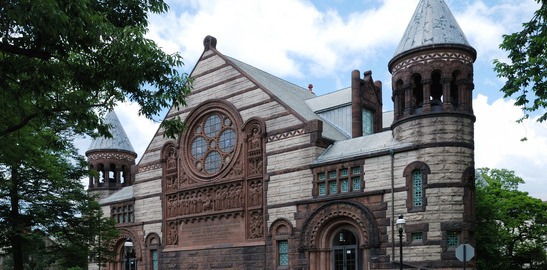The First Ivy League Basketball Tournament
Princeton’s basketball team arrived at the inaugural Ivy League tournament understandably resentful that the presidents of the eight institutions had decided, after 60 years, that this was the year to begin holding a postseason tournament. The Tigers had gone a perfect 14-0 during the regular season — the league’s first undefeated campaign in years — and had won the title by 4 games over second place Harvard. But, because of the new tournament, they had to take the court once again to play 4th-seeded Penn, which had finished with a 6-8 record, on the Quakers’ home court. Princeton’s worst fears almost came true!
Since it was the last NCAA Division I conference not to have a postseason tournament, the possibility of having one in the Ivy League had long been under consideration. The idea was further encouraged by the nail-biter 2015 Harvard-Yale playoff game brought about by a regular season tie. This donnybrook was the epitome of March Madness. It resounded among the alumni, students, athletic departments, and administrations of the Ancient Eight. The excitement of that one game unsettled the balance of a classic sports debate about the value of regular-season standings versus a postseason tournament, which holds the potential for two days of luck by one team overcoming a full season of excellence by another. But the scales tipped in favor of holding a tournament beginning in 2017. It turned out to be a barnburner!
The Ivy League’s top four men’s and women’s teams were invited to the Palestra on Penn’s campus, the “cathedral of college basketball”, for a semifinal quadruple-header on Saturday, March 11, with both finals the next day. In the Men’s Division, 1st seed Princeton played 4th seed Penn and 2nd seed Harvard played 3rd seed Yale. All four teams played the type of physical ball common to postseason games. Every rebound was contested, every pass challenged, and every screen mauled.
In the first men’s semifinal, the Tigers, who were heavy favorites, never held the lead at any time in the 40 minutes of regulation. They did, however, manage to rally from a 10-point deficit late in the second half. Then Myles Stephens, a sophomore, deftly laid in an offensive rebound with 5.3 seconds on the clock to tie the score and force overtime. Stephens started the overtime with two quick field goals on his way to a game-high 21 points. Princeton won in overtime 72-64.
To earn the win, the Princeton team had to overcome a rare subpar performance, exemplified by the combined 6-for-25 shooting production from its three All-Ivy League players, Spencer Weisz, the Ivy League Player of the Year, and Steven Cook. The third, Devin Cannady, was just 1-for-8 from the field. As a team, they shot only 28% from 3-point range. The Tigers trailed by 10 points in the second half for the first time in any game all season. Princeton cager’s near-failure in regulation was very nearly the doomsday scenario that critics of a tournament had warned about.
The undercard on Saturday was a classic matchup of arch rivals. After losing two regular season games to Harvard, Yale turned on its adversary to claim a tough 73-71 victory. The win allowed Yale to take the floor again on Sunday to face Princeton for the tournament championship and an automatic bid to the NCAA tournament.
Princeton’s matchup with Yale also started poorly as they quickly fell behind by 5. They were still down at the half but only by a point. From there on, however, the Tigers took control. They went on to win the game 71-59, the tournament, and the NCAA bid.
Princeton made an impressive, if brief, showing in the NCAA tournament. Their game, in the first round of the Western Regionals, was played in Buffalo on March 16. It showcased Notre Dame, the 5th seed, against the Ivy League champs at the #12 seed. The Tigers rallied from 11 points down in the second half and the game’s outcome turned on a last-second shot when Princeton’s Cannady missed a long 3-pointer that would have won the game. The Fighting Irish thus avoided an upset and edged the Tigers, 60-58. Notre Dame’s versatile star forward, Bonzie Colson, led all scorers with 18 points. Weisz led Princeton with 15.
Despite that loss, Princeton’s prior win over Yale at the Palestra on March 12 made them the proud winners of the first “Ivy Madness” basketball tournament. They punched their own ticket to the NCAA’s big dance—twice!
If you’re an athlete who aspires to attend an Ivy League school, using IvySelect as your college admissions consulting firm improves your chances of admission in two important ways. First, we assure that your overall application is of excellent quality in all respects. Second, we guide your communications with coaches who may be interested in recruiting you.
In addition to the Ivies, IvySelect assists student athletes seeking admission to other elite private universities such as Duke, Northwestern, and Stanford, and elite public universities like North Carolina, Berkeley, and Michigan, all of which recruit students who are outstanding in athletics and academics. As a student-athlete, you’ll benefit substantially by hiring IvySelect to provide sound advice and expert counseling to help you to attain your educational goals.




